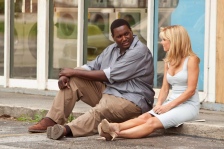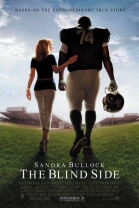The Blind Side
|  “Is this a white liberal guilt thing?” That question, posed by one of the wealthy white socialite friends of Leigh Anne Tuohy (Sandra Bullock) during an overpriced-salad lunch near the middle of John Lee Hancock’s The Blind Side, could very well be directed at the entire subgenre of Hollywood cinema, which dates back to the 1940s, of which Hancock’s film is proudly a member. For decades Hollywood has turned out films in which empathetic white characters offer some form of rescue, whether it be physical or spiritual, to suffering and oppressed minorities, and all of them have tread the fine line between compassion and condescension, some more successfully than others. There is something inherently dangerous in stories that rely on black uplift resting on white shoulders, so even when a film like The Blind Side is based on a true story, it runs the risk of racial arrogance. “Is this a white liberal guilt thing?” That question, posed by one of the wealthy white socialite friends of Leigh Anne Tuohy (Sandra Bullock) during an overpriced-salad lunch near the middle of John Lee Hancock’s The Blind Side, could very well be directed at the entire subgenre of Hollywood cinema, which dates back to the 1940s, of which Hancock’s film is proudly a member. For decades Hollywood has turned out films in which empathetic white characters offer some form of rescue, whether it be physical or spiritual, to suffering and oppressed minorities, and all of them have tread the fine line between compassion and condescension, some more successfully than others. There is something inherently dangerous in stories that rely on black uplift resting on white shoulders, so even when a film like The Blind Side is based on a true story, it runs the risk of racial arrogance.Thankfully, Hancock treads the line with grace and humanity, which allows him to take what could have been a cliché three-hanky tearjerker designed to assuage white guilt and turn it into something deeper and more meaningful (while Hancock is routinely cited as the director of 2004’s crowd-pleaser The Rookie, many forget that his breakthrough was writing the tough, but sensitive screenplay for Clint Eastwood’s 1993 film A Perfect World). The Blind Side is by no means a perfect film, and there are times when it slips into easy Hollywood formulas that undercut the realities of its almost-too-good-to-be-true narrative, but Hancock is clearly invested in the kind of empathy and decency that transcends color and suggests that, if we could just see others first and foremost as fellow human beings, the world would be a much better place in which to live. It is also a film that dares to suggest that Christian morality, as evoked by genuine but flawed people, is a true phenomenon that might shape lives, rather than a hypocritical piousness to be sneered at. Based on the 2007 nonfiction book The Blind Side: Evolution of a Game, Hancock’s film tells the unlikely story of Michael Oher (Quinton Aaron), a black teenager who was born and raised in the Memphis ghetto and was all but homeless when he was admitted into a private Christian school and then essentially adopted by the Tuohys, a wealthy white family whose collegiate allegiance to Ole Miss and Republican political values might have turned them into caricatures of hypocritical Southern privilege in another film. The family’s matriarch, Leigh Anne, a fiery Southern belle with a solid sense of decency to match her tart tongue, is saved from saccharine sainthood by Bullock’s tough yet compassionate performance. A woman who speaks her mind and lets no one push her around, Leigh Anne is a fundamentally fascinating character who is more interesting when she’s trying to hide her emotions; while many films of this sort would strive to elicit tears through Leigh Anne’s sensitivity, The Blind Side encourages us to root for her as we would a quarterback driving his team down the field against all odds. Similarly, relative newcomer Quinton Aaron’s performance as Michael Oher, who is now an offensive lineman for the Baltimore Ravens, avoids many treacherous pitfalls. Large and withdrawn, he could have easily been reduced to another black martyr and saddled with speeches that spell out the film’s implied messages. Instead, Hancock allows him to grow as a multidimensional character who has been shaped by his rough past (which we see only in fleeting flashes, enough to give us a sense of horror without rubbing our noses in it), but is not yet fully formed. Aaron brings a gentleness and sensitivity to the character that belies his girth, and when we find out that he scored 98% on a protectiveness scale, it doesn’t surprise us at all. His integration into the Tuohy family feels a bit too easy at times, but the natural connection he shares with the family, which includes husband Sean (Tim McGraw), teenage daughter Collins (Lily Collins), and adolescent son S.J. (Jae Head), makes the film work. As the holiday-timed product of a Hollywood studio, The Blind Side caves to certain audience-pleasing expectations, but never to the extent that it compromises its sense of genuineness. One heavy-handed scene finds Leigh Anne returning to the projects where Michael was born and raised and upstaging a gangster who has it out for Michael; from an emotional standpoint, the scene works, but it doesn’t take much to start questioning the likelihood of a gang member on his own turf so easily backing down from the threats of a white suburban woman. Yet, even with such missteps, The Blind Side works as a whole, earning its sense of hard-won triumph without forcing the obvious. Copyright ©2009 James Kendrick Thoughts? E-mail James Kendrick All images copyright © Warner Bros. |
Overall Rating: 

 (3)
(3)


